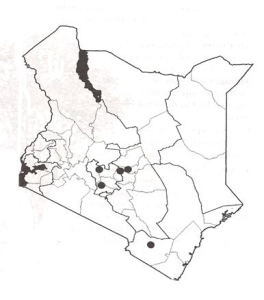Scientific name
Ocotea usambarensis
Order / Family
Lauraceae
Local Names
Embu (Muzura); English (East Africa Camphor wood); Kikuyu (Muthaiti); Meru (Muura); Taita (Mkongo).
Introduction
General Distribution:
A majestic evergreen timber tree widely distributed from the eastern parts of the DRC and Rwanda, throughout eastern Africa to northern parts of Malawi and Zambia. More common in wetter forests.
 |
| Distribution of Octea usambarensis in Kenya |
| © Maundu P. and Bo Tengnas. (2005). Useful trees and shrubs for Kenya, World Agroforestry Centre. |
General Information about the Tree:
Planting of this useful, valuable (and now rare) tree should be encouraged. The timber is one of the best for furniture, although not resistant to termites. The tree is easily propagated from root suckers, a practice widely used in northern Tanzania.
Biophysical Limits:
Optimum growth requires deep fertile soils with good drainage. Once dominant in the wet forests of the eastern Aberdares and southern Mt. Kenya, up to 2,600 m, also in Taita Hills, but now rare everywhere due to over-exploitation. Agro-ecological zones I - II.
Propagation and Tree Management
Root suckers and seedlings may be used to propagate it. It is fast growing and responds well to coppicing. Occurs in plantations and mixed systems.
Products:
- Medicine; medicine may be extracted from the roots and inner bark.
- Firewood; is a source of firewood.
- Timber; (joinery), furniture, poles, veneer, plywood, paneling,
Services:
- Shade; it provides shade in hot sun
- Soil erosion; its roots hold the soil together preventing soil erosion:
Pests and Diseases
The fruits are highly susceptible to gall insects which heavily attack them, and the wood is susceptible to termites.
Information Source Links
- Anon. (1986). The useful plants of India. Publications & Information Directorate, CSIR, New Delhi, India.
- Maundu P. and Bo Tengnas. (2005). Useful trees and shrubs for Kenya, World Agroforestry Centre. ISBN-9966-896-70-8.
- www.worldagroforestrycentre.org
